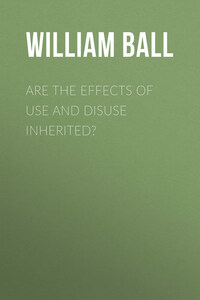My warmest thanks are due to Mr. Francis Darwin, to Mr. E. B. Poulton (whose interest in the subject here discussed is shown by his share in the translation of Weismann's Essays on Heredity), and to Professor Romanes, for the help afforded by their kindly suggestions and criticisms, and for the advice and recommendation under which this essay is now published. Encouragement from Mr. Francis Darwin is to me the more precious, and the more worthy of grateful recognition, from the fact that my general conclusion that acquired characters are not inherited is at variance with the opinion of his revered father, who aided his great theory by the retention of some remains of Lamarck's doctrine of the inherited effect of habit. I feel as if the son, as representative of his great progenitor, were carrying out the idea of an appreciative editor who writes to me: "We must say that if Darwin were still alive, he would find your arguments of great weight, and undoubtedly would give to them the serious consideration which they deserve." I hope, then, that I may be acquitted of undue presumption in opposing a view sanctioned by the author of the Origin of Species, but already stoutly questioned and firmly rejected by such followers of his as Weismann, Wallace, Poulton, Ray Lankester, and others, to say nothing of its practical rejection by so great an authority on heredity as Francis Galton.
The sociological importance of the subject has already been insisted on in emphatic terms by Mr. Herbert Spencer, and this importance may be even greater than he imagined.
Civilization largely sets aside the harsh but ultimately salutary action of the great law of Natural Selection without providing an efficient substitute for preventing degeneracy. The substitute on which moralists and legislators rely – if they think on the matter at all – is the cumulative inheritance of the beneficial effects of education, training, habits, institutions, and so forth – the inheritance, in short, of acquired characters, or of the effects of use and disuse. If this substitute is but a broken reed, then the deeper thinkers who gradually teach the teachers of the people, and ultimately even influence the legislators and moralists, must found their systems of morality and their criticisms of social and political laws and institutions and customs and ideas on the basis of the Darwinian law rather than on that of Lamarck.
Looking forward to the hope that the human race may become consciously and increasingly master of itself and of its destiny, and recognizing the Darwinian principle of the selection of the fittest as the only means of preventing the moral and physical degeneracy which, like an internal dry rot, has hitherto been the besetting danger of all civilizations, I desire that the thinkers who mould the opinions of mankind shall not be led astray from the true path of enduring progress and happiness by reliance on fallacious beliefs which will not bear examination. Such, at least, is the feeling or motive which has prompted me to devote much time and thought to a difficult but important inquiry in a debatable region of inference and conjecture, where (I am afraid) evidence on either side can never be absolutely conclusive, and where, especially, the absolute demonstration of a universal negative cannot reasonably be expected.
IMPORTANCE AND BEARING OF THE INQUIRY
The question whether the effects of use and disuse are inherited, or, in other words, whether acquired characters are hereditary, is of considerable interest to the general student of evolution; but it is, or should be, a matter of far deeper interest to the thoughtful philanthropist who desires to ensure the permanent welfare and happiness of the human race. So profoundly important, in fact, are the moral, social, and political conclusions that depend on the answer to this inquiry, that, as Mr. Herbert Spencer rightly says, it "demands, beyond all other questions whatsoever, the attention of scientific men."
It is obvious that we can produce important changes in the individual. We can, for example, improve his muscles by athletics, and his brain by education. The use of organs enlarges and strengthens them; the disuse of parts or faculties weakens them. And so great is the power of habit that it is proverbially spoken of as "second nature." It is thus certain that we can modify the individual. We can strengthen (or weaken) his body; we can improve (or deteriorate) his intellect, his habits, his morals. But there remains the still more important question which we are about to consider. Will such modifications be inherited by the offspring of the modified individual? Does individual improvement transmit itself to descendants independently of personal teaching and example? Have artificially produced changes of structure or habit any inherent tendency to become congenitally transmissible and to be converted in time into fixed traits of constitution or character? Can the philanthropist rely on such a tendency as a hopeful factor in the evolution of mankind? – the only sound and stable basis of a higher and happier state of things being, as he knows or ought to know, the innate and constitutionally-fixed improvement of the race as a whole. If acquired modifications are impressed on the offspring and on the race, the systematic moral training of individuals will in time produce a constitutionally moral race, and we may hope to improve mankind even in defiance of the unnatural selection by which a spurious but highly popular philanthropy would systematically favour the survival of the unfittest and the rapid multiplication of the worst. But if acquired modifications do not tend to be transmitted, if the use or disuse of organs or faculties does not similarly affect posterity by inheritance, then it is evident that no innate improvement in the race can take place without the aid of natural or artificial selection.








